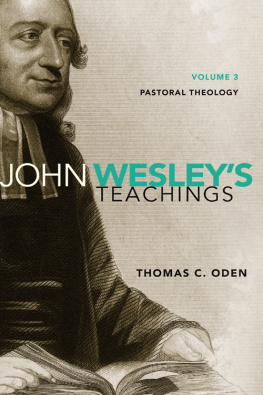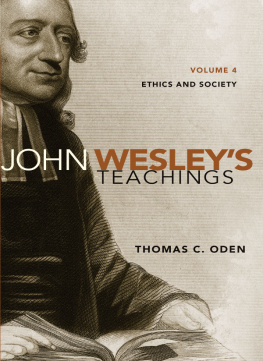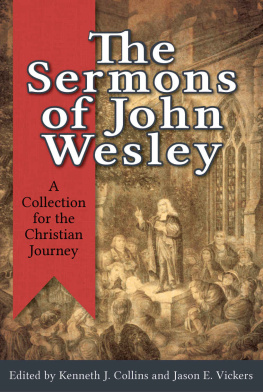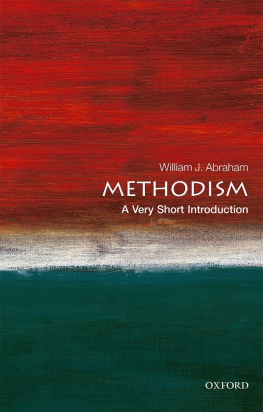Gregory S. Clapper
By Clapper, Gregory S.
Copyright1997 by Clapper, Gregory S.
Why Should Anyone Care About a Wesleyan Spirituality?
T his book is designed to give the reader a solid grounding in the spirituality, or heart religion, of John Wesley. We will not look a t Wesley as a person so much as we will look w i t h him. This means that I will not be rehearsing Wesleys own spiritual development, but instead will share his vision of how Christian faith is embodied in that central core of what we think, what we will, and what we feelin short, the deepest center of who we are: the human heart.
In What Way is this a Wesleyan Spirituality?
This is a Wesleyan spirituality for two reasons. The first is that it is scripturally based. I will use the Bible as my main reference. This seems the most appropriate method for a study in the tradition of a man who thought of himself as h o m o u n i u s li b r i - a man of one book (i.e., the Bible). I will focus on scriptural passages (including many that Wesley himself emphasized) to describe the basic building blocks of the Christian life. References to John Wesleys own worksand to the hymns of his brother Charles Wesleyare given for the interest of those who want to pursue certain issues in more depth, but scripture will be my touchstone.
The second reason this is a Wesleyan spirituality is that I will be guided in my interpretation of scripture by the Wesleyan interpretive tradition, a tradition that reflects Wesleys wide and deep reading as an Oxford fellow and lecturer. This man of one book read hundreds of other books in order to help him interpret the most important book. Based on his extensive reading, Wesleys theology emphasized two fundamental elements of the Christian tradition: Gods initiating grace and humanitys freedom to respond to this grace. I will show these elements in action in the biblical passages I interpret rather than make them the subject of a self-conscious theoretical elaboration. This book, therefore, will not be an exercise in polemics, eagerly showing how the Wesleyan tradition might differ from some others. Instead I will simply portray in a positive way this broad and strong branch of the Christian tradition.
The Wesleyan interpretive tradition will be most obvious through the use of an image that Wesley used to describe the es- sentials of both Christian doctrine and the Christian life. This image is that religion is like a house. The three main parts of Wesleys house of religion are repentance, faith, and holiness. Each of these foundational themes will be the focus of one chapter, and unpacking the richness of this house image will be the heart of the book.
Before we begin exploring this image, I wish to make a few remarks about the biblical basis of this work and about taking Wesleys theology as our guide to biblical interpretation.
Why Should a Spirituality be Biblically Based?
John Wesley thought that the Bible contained all the information that was necessary for a person to be rightly related to God. In writing a spirituality (or a guide to the Christian life) in the tradition of John Wesley, I have depended, as he did, on the truths found in the scriptures. In this emphasis on the importance of scripture, of course, Wesley was hardly unique in the Christian tradition. In fact, this emphasis on scripture puts him in the mainstream of orthodox understandings of Christianity.
Other spiritual seekers, however, such as the Deists in Wesleys time and many people in our own daydo not look to the Bible in their spiritual quest. Let us, then, briefly explore this question of why we should take the time and effort to construct a biblically based spirituality. This I do especially for the purpose of inviting those unaccustomed to the Bible to give it a serious try.
First of all, we need not preface the discussion of the Bible with intimidating theories about its infallibility or inerrancy. Discussions around those words usually yield little light and much heat, and they are usually incomprehensible for anyone outside of the Christian community (and for many inside!) I want to start with a humbler but very suggestive approach.
H. A. Nielsen in his helpful little book T h e Bi b l e: A s I f fo r t h e Fi r s t T i m e used a phrase that gets to the root of why people should take the Bible seriously in their spiritual quests. He said that rumors of nourishment surround the Bible, and that these rumors should invite the hungry seeker to try it. For thousands of years, people have been spiritually nourished by the collection of stories, character studies, words of wisdom, prophecies, songs, poems, and moral teachings that the Christian community calls the Bible. By prayerfully searching this diverse collection of literature, the Christian community finds the nature of God and the nature of humanity revealed. We need to be drawn by nothing more fancy or involved than these rumors of nourishment to start on our journey of a biblically based spirituality.
Those who already identify themselves as being in the Christian tradition may not need these teasing rumors of nourish- ment in order to explore the Bible, but sometimes Christians also have ideas about the Bible that prevent them from getting the most out of the scriptures. Sometimes Christians are so immersed in studying the Bible, are so used to hearing its familiar cadences and phrases, that they lose sight of the real purpose of the book.
If one observed the various Bible studies, Sunday school classes, and sermons to which people are exposed, one might think that the main point of being a Christian is to know, perhaps even memorize, as much of the Bible as possible. This is a fundamental mistake. To understand more clearly the nature and purpose of the Bible, let us look at a key passage in the Bible itself and also at a helpful quote by one of Christianitys most influential theologians.
The passage in Timothy :- reads as follows: All scripture is inspired by God and is useful for teaching, for reproof, for correction, and for training in righteousness, so that everyone who belongs to God may be proficient, equipped for every good work.
Here we clearly see that scripture is not an end in itself. Instead, it is to be used for teaching (for instance, about who God is and who humanity is); for reproof and correc- tion (that is, for helping people get back on track when they have fallen away from the Christian life); and for training in righteousnessin short, for the task of spiritual formation. We should study the Bible not just to pile up more quotations in our head, but we should become more biblically informed so that our whole lives will become congruent with the vision of God and humanity revealed in scripture. When our lives are so formed, we will be equipped for every good work, ready to be the people that God calls us to be so that we can do what God calls us to do.
Saint Augustine, Bishop of Hippo (-) in his powerful little book O n C h r i st i a n D o c t r i n e wrote that the purpose of the Holy Scripture is to develop the virtues of faith, hope, and love. He even said that if the believer has an unshakable hold on faith, hope, and love, he or she no longer needs the Bible, except for the instruction of others. While this might sound radical and scary to some, I think it underlines the fundamental point of the passage from Second Timothy, which is that the Bible does not exist for its own sake; rather, it exists for spiritual formation. That is the use to which I will put the Bible in this book.










